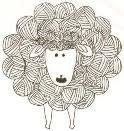As I have felt that I needed to focus on more spinning matters I duly I signed up to blog on the first Wednesday of every month. Having missed the first Wednesday in October I thought I would write on the wrong Wednesday on the matter of 'wrong' fibres............
Particularly on some of the misconceptions about 'natural fibres'. What is a natural fibre - well sheep fleece is about as natural as you can get and green, because the sheep obligingly grows a new one every year. The same can said for any animal coat/fleece all as nature intended.
But what about other so called natural fibres? In the latest Yarnwise magazine there is an article on vegetarian fibres , but how many people know how these fibres are produced? The most common are Bamboo, Soya, Ingeo (Corn), Linen, Ramie, Banana and Milk Protein and a lot of spinners have probably spun them. All these go through innumerable processes, far more than in wool production. Importantly all of these fibres require rutting, that is breaking down the cellulose in the stems. Not many people realise that the rutting of Flax in local streams causing incredible pollution in the past and was a major killer of fish! Some processes use chemicals to speed things up and reminds me of the way decaffeinated coffee is created! To take the caffeine out of coffee chlorine gas is used! This was the gas used in the trenches during WWI, just thought I would throw this in as I really can't understand why anyone would want to drink such a beverage - decaf tea goes through the same by the way! Drink less, but drink the best that's my motto...........
I don't know why I am surprised, but there is a growing interest in Vegan Knitting, and all these natural fibres are high on their list of suitable yarns, which includes acrylic - why? Acrylic is a by product of oil, oil prices have shot up, so no surprise that Acrylic Yarns are getting more expensive!!! But apparently shearing sheep is cruel and believe it or not there is a commonly held thought that shearing actually kills the sheep!! Another argument against wool is cruel treatment of sheep during shearing, but I have witness many sheep being sheared and quite honestly they seemed very pleased to get rid of the heavy fleece. But hey hoy, everyone is entitled to their own opinion..............
Another argument is that wool causes allergies................. does it? As someone who as numerous allergies I have never had a problem with wool - alpaca yes, but wool never, thank goodness! A real problem as so many yarns nowadays seem to include alpaca - even more reason to always read the label!
What was a mere inconvenience has developed into a real problem - just touching alpaca fibre starts the itching and more sees a rash develope on my palms - so time to detash and Chez Sassy is now a completely Alpaca (and Acrylic) free zone!
In conclusion - this week's dyeing on Polwarth
Lightwings
English Spring Meadow






Thanks for joining us on Spinspiration.
ReplyDeleteWhat a great post, it always interests me to read into natural fibres too and I'm sure, like you, that many people don't realise the amount of processes that things go through, and the environmental effects.
The Vegan side of things also opens up such debate amongst folk. I think some of the argument holds up as the native breeds shed their fleece and sheep these days need shearing because of the way they have been bred, so yes now they need shearing. I for one am glad of their fleeces, and believe good shearers cause no harm to sheep; but it's certainly one of those subjects with varying opinions.
Love the English Spring Meadow Polwarth, look forward to seeing the spinning.
Dawn x